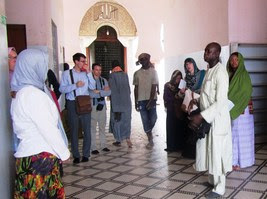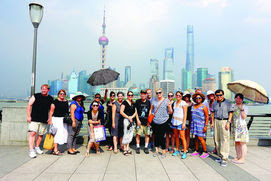Deadline: December 28, 2016

Did
you know that the U.S. Department of Education provides grants to K-12
and postsecondary educators to study and travel abroad?
The Fulbright-Hays Seminars Abroad Program provides short-term
seminars abroad for U.S. educators in the social sciences and
humanities to improve their understanding and knowledge of the peoples
and cultures of other countries. Each seminar features educational
lectures and activities specifically designed for the group, including
visits to local schools and organizations, meetings with teachers and
students, and visits to cultural sites. Participants draw on their
experiences during the program to create new, cross-cultural curricula
for their classrooms and school systems back in the U.S.
In 2017, summer programs will be offered in Bulgaria, Chile, and Thailand. A total of 48 awards are available (sixteen per program). The program covers airfare, room and board, and program costs. Teacher participants are responsible for a cost-share of $600.

Here's what past Seminars Abroad participants have to say about the program:
"Without
a doubt the ENTIRE trip was amazing! All of the activities were related
to each other and sequenced in a thoughtful way. All activities were
meaningful and left a lasting impression."
"Thanks
to the inspired and collaborative contributions from my fellow
participants, I return with an arsenal of lessons that bring a modest
slice of the world back home to my students."
"My
Seminars Abroad experience will allow me to introduce to my students
pertinent first-hand information about the world. I plan on doing so
through the development of curriculum units that will give my students
the opportunity to explore cultural heritage and compare their own
culture with other cultures.”
"There have been so many great collaborations to come out of the Seminars Abroad program, and I'm filled with
gratitude. The Fulbright-Hays programs
have done so much for my research and teaching!"

2017 Seminars Application NOW AVAILABLE

The 2017 Seminars Abroad application is now available on the G5 website at www.g5.gov.
If you are a new user, click “Sign Up” on the G5 Homepage. Once registered and activated, click on “Package Submission” under Grant Setup. Follow the steps provided, filling out the forms and uploading the necessary files. See the Application package for more detailed directions.
|
ELIGIBILITY REQUIREMENTS
In order to be eligible for the Fulbright-Hays Seminars Abroad program, the applicant must meet the following requirements:
- Must be a citizen or permanent resident of the United States
- Must hold a Bachelor’s degree from an accredited college or university
- Must have at least 3 years of full-time teaching or administrative experience by time of departure
- Must
be currently employed full-time in a U.S. school, institution of higher
education, Local Educational Agency, State Educational Agency, library,
or museum as a teacher/ administrator
- Must be an educator in the Arts, Humanities, or Social Sciences (this criterion does not apply to administrators)
- Must work at the grade level of the seminar
- Must be physically and psychologically able

Webinar: Application Technical Assistance, December 5

Join us for a webinar at 2:00pm ET on December 5, 2016, for technical assistance in preparing your Seminars Abroad application. IFLE
staff will provide webinar attendees with guidance on how to use the G5
electronic application system, prepare a competitive application, and
troubleshoot technical issues.
In
order for the webinar to best serve the needs of all applicants, please
submit any questions regarding the competition and application in
advance to Maria Chang (maria.chang@ed.gov) so that we can be sure to address them during the session.
When: Wednesday, December 5, 2016 (2:00pm - 3:00pm ET)
|
 
Examples of Past Seminars Abroad

India 2016Sustainable Development and Social Change
For five weeks in July and August 2016, sixteen U.S. high school educators explored
issues, challenges and strategies related to India’s developmental
goals. During the seminar, participants broadened their knowledge of
India’s past, present and future socio-economic developmental
strategies, and learned about the rich and diverse cultural heritage of the country through visits to Delhi, Jaipur, Ahmedabad, Pune, Madurai, Kolkata, and Varanasi. The group met with policymakers
and planners, academicians, social workers and community members on
their visits to organizations working in the areas of environmental
protection, renewable energy, poverty eradication, women’s empowerment,
and education.
|

Peru 2016Exploring Indigenous Heritage
This
past summer's Seminar Abroad to Peru offered sixteen K-8 teachers from
the U.S. the opportunity to learn about present-day Peru through a
guided exploration of the country’s history. The trip featured cultural,
political and social visits in and around Arequipa, Cusco, Lima, Madre
de Dios, and Puno. Participants interacted with Peruvian specialists in
education, history, art, architecture, economic and public policy during
visits to urban areas and historical towns, acquiring a unique insight into the challenges facing Peruvian culture in the 21st century.
|

Senegal 2016Religion and Diversity in West Africa
The
2016 Seminar Abroad to Senegal offered an opportunity for sixteen
postsecondary faculty from U.S. institutions to explore religious and
cultural diversity in West Africa. The seminar explored Senegal as a
diverse society with peaceful ethnic and religious coexistence, and
participants had the chance to meet with academics, religious leaders,
and activists from diverse disciplines and organizations in areas like
Dakar, Gorée, Saint-Louis, Touba, Djiloor, Toubacouta, Ziguinchor, and Cap Skirrig. Visits
to mosques and churches, historic, cultural, and political sites, civil
society groups, and universities provided participants with insight
into the expressions of Islam, Christianity, and indigenous religions
in the region as well as broad knowledge about the country to integrate
into their classes, schools, and communities back in the U.S.
|

China 2015
Sixteen U.S. K-12 teachers traveled to China last summer with the Seminars Abroad Program. The teachers learned about China's educational system through visits to China's Ministry of Education, Beijing's Dandelion School and Nong Jia Nu School, Tsinghua University, Chongqing's Tongliang Middle School, and the Shanghai Institutes for International Studies, visiting with educators, students, government officials, and public policy experts. Participants also learned about Chinese history, arts, religion, and traditional medicine through visits to Tian'anmen Square, the Forbidden City, the Great Wall, the Qin Terra Cotta Warriors, Banpo Neolithic village, Beijing's Dashanzi Art District, the Great Mosque, Jing'an Temple, and the Shanghai University of Traditional Chinese Medicine.
|
ENGAGE WITH US
IFLE on YouTube!
Follow us on Twitter @GoGlobalED

IFLE is on Twitter with the latest from the world of international and foreign language education. Follow us @GoGlobalED and tell your friends! We'll see you in the Twittersphere! |

If
you know someone who would like to receive the IFLE newsletter, encourage them
to sign up HERE!
|




























